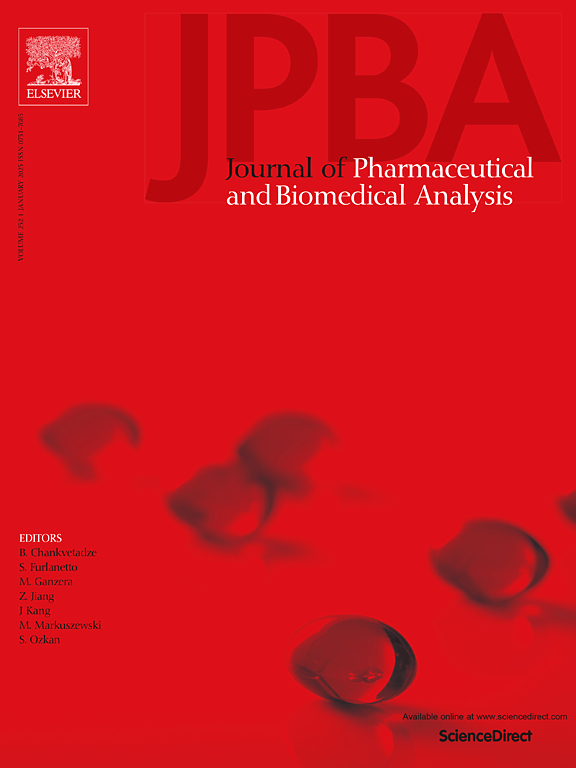Coupling microextraction techniques with substrate spray mass spectrometry, towards a faster analysis of biological samples
IF 3.1
3区 医学
Q2 CHEMISTRY, ANALYTICAL
Journal of pharmaceutical and biomedical analysis
Pub Date : 2024-10-18
DOI:10.1016/j.jpba.2024.116535
引用次数: 0
Abstract
Direct coupling sample preparation with mass spectrometry has risen as a reliable analytical strategy in bioanalysis as it provides a high sample throughput. This approach avoids an exhaustive separation step, thus being cost-effective compared to the traditional analytical workflow. The selectivity and sensitivity levels rely on the mass spectrometric analysis and the appropriate selection of the sample preparation. Miniaturized extraction techniques have demonstrated particular utility in this coupling thanks to their ability to pre-concentrate the target analytes while removing many of the matrix components. This article reviews the main developments in combining microextraction techniques with mass spectrometry based on electrospray ionization, a consolidated ionization technique in bioanalysis. The article aims to provide an overview of the potential of these techniques by describing the most significant examples. The different approaches are classified according to the materials or devices used to perform the extraction and analysis.
将微萃取技术与基质喷雾质谱联用,实现更快的生物样品分析。
直接将样品制备与质谱联用已成为生物分析领域一种可靠的分析策略,因为它能提供较高的样品通量。这种方法避免了详尽的分离步骤,因此与传统的分析工作流程相比具有成本效益。选择性和灵敏度水平取决于质谱分析和样品制备的适当选择。微型化萃取技术能够在去除许多基质成分的同时预先浓缩目标分析物,因此在这种耦合中表现出了特殊的实用性。本文回顾了将微萃取技术与基于电喷雾离子化的质谱技术相结合的主要发展情况,电喷雾离子化是生物分析领域的一种综合离子化技术。文章旨在通过介绍最重要的实例,概述这些技术的潜力。不同的方法根据用于进行萃取和分析的材料或设备进行了分类。
本文章由计算机程序翻译,如有差异,请以英文原文为准。
求助全文
约1分钟内获得全文
求助全文
来源期刊
CiteScore
6.70
自引率
5.90%
发文量
588
审稿时长
37 days
期刊介绍:
This journal is an international medium directed towards the needs of academic, clinical, government and industrial analysis by publishing original research reports and critical reviews on pharmaceutical and biomedical analysis. It covers the interdisciplinary aspects of analysis in the pharmaceutical, biomedical and clinical sciences, including developments in analytical methodology, instrumentation, computation and interpretation. Submissions on novel applications focusing on drug purity and stability studies, pharmacokinetics, therapeutic monitoring, metabolic profiling; drug-related aspects of analytical biochemistry and forensic toxicology; quality assurance in the pharmaceutical industry are also welcome.
Studies from areas of well established and poorly selective methods, such as UV-VIS spectrophotometry (including derivative and multi-wavelength measurements), basic electroanalytical (potentiometric, polarographic and voltammetric) methods, fluorimetry, flow-injection analysis, etc. are accepted for publication in exceptional cases only, if a unique and substantial advantage over presently known systems is demonstrated. The same applies to the assay of simple drug formulations by any kind of methods and the determination of drugs in biological samples based merely on spiked samples. Drug purity/stability studies should contain information on the structure elucidation of the impurities/degradants.

 求助内容:
求助内容: 应助结果提醒方式:
应助结果提醒方式:


